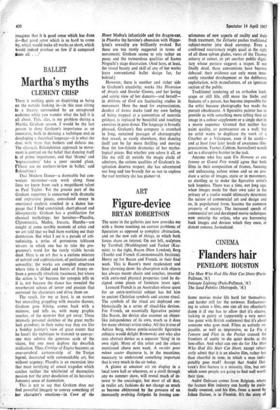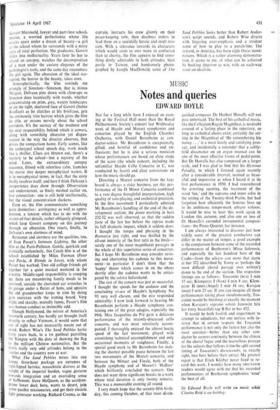CINEMA
Flanders hair
PENELOPE HOUSTON
Intimate Lighting (Paris-Pullman, 'A')
The Sand Pebbles (Metropole, 'A') Some movies make life hard for themselves, and harder still for the reviewer. Endeavour- ing to salute a film, one can all too effectively damn it if one has to allow that it's elusive, lacking in gaiety or (apparently a very sensi- tive point with British audiences) that it's about someone who goes mad. Films as actively en- joyable, as well as impressive, as La Vie a tenvers and Fists in the Pocket crossed the frontiers of sanity to die quiet deaths at the box-office. And what can one do for The Man Who Had His Hair Cut Short, except reluct- antly admit that it is an elusive film, rather less than cheerful in tone, in which a man indis- putably goes mad? Accept that Andre Del- vaux's first feature is a minority film, but one which some people are going to find well worth their time.
Andre Delvaux comes from Belgium, where the feature film industry can hardly be statis- tically counted, and his film, from a novel by Johan Daisne, is in Flemish. It's the story of
Govert Miereveld, lawyer and part-time school. master, a worried perfectionist whose life cracks apart under a dream of beauty—a girl at the school whom he surrounds with a misty aura of total perfection. She graduates; Govert slides into ineffectuality. Years later he has to attend an autopsy, watches the decomposition of a man under the austere elegance of the pathologist's tools, and the same day encounters the girl again. The obsession of the ideal cor-
rupted, the horror in the beauty, takes over.
Atmospherically, the film reminds me strongly of Simenon—Simenon, that is, minus Maigret. Delvaux pins down with close-ups as Simenon does laconically with words, whether
concentrating on prim, grey, watery landscapes or on the tight, shuttered face of Govert (Senne Rouffaer) as he clutches at his briefcase, gets the ominously trim haircut which gives the film its title, or moons nervily about the school corridors. It's the secrecy of the madness and the neat respectability behind which it cowers, along with something obsessive yet dispas- sionate in the way the director observes, that drives the comparison home. Early scenes, like the archetypal school speech day, work much like a thriller. Clues are thrown out, there's a mystery to be solved—but a mystery of the mind. Later, the extraordinary autopsy sequence, filmed with relentless calm, launches the movie into deeper metaphysical waters. It is in metaphysical terms, in fact, that the story finally resolves itself; and here I think Delvaux's inexperience does show through. Observation and undercurrent, so finely meshed earlier on, lose connection : one is still held intellectually, but the visual concentration slackens.
Even so, the film communicates something quite distinctive: astringency as well as appre- hension, a tension which has to do with the matter-of-fact details, rather obliquely glimpsed, which keep Govert company on this journey through an obsession. One reacts, finally, to Delvaux's own alertness of mind.
Reticence and alertness are the qualities, too, of Ivan Passer's Intimate Lighting, the other film at the Paris-Pullman. Gentle, quirkish and ironically melancholy, this Czech film is of the school established by Milos Forman (Peter and Pavia, A Blonde in Love), with whom Passer has worked. Two old college friends get together for a quiet musical weekend in the country. Middle-aged responsibility is creeping up, there are meandering family meals to be survived, outside the cherished car crouches in its garage under a flutter of hens, and upstairs the old grandmother keeps in trim by doing gym exercises with the ironing board. Very slight and sketchy, mutedly funny, Passer's film sees human conduct as invincibly odd.
Though Hollywood, the mirror of America's twentieth century, has hardly yet brought itself directly to reflect Vietnam, it would seem that out of sight has not necessarily meant out of mind. Robert Wise's The Sand Pebbles harks forty years back, to a us gunboat patrolling the Yangtze with the duty of showing the flag to the militant Chinese nationalists. But the film's really very odd attitudes belong to the sixties and the country now at war.
What The Sand Pebbles mixes into one l!inlOy three-hour package are extremes of tight-lipped heroics; masochistic distress at the weight of the imperial burden, vague gestures towards integration and an overriding sense of bafflement. Steve McQueen, as the accident- prone lower deck hero, wants to desert, join Some pacifist missionaries, and get their electric light generator working. Richard Crenna, as the captain, instructs his crew glumly on their peace-keeping role, then disobeys orders to lead them on a suicidally heroic and inept mis- sion. With a tolerance towards its characters which would seem to owe more to confusion than to charity, the film appears to find some- thing dimly admirable in both attitudes. Shot partly in Taiwan, and handsomely photo- graphed by Joseph MacDonald, some of The Sand Pebbles looks better than Robert Ander- son's script sounds, and Robert Wise directs with lingering over-emphasis and a strident sense of how to play to a punch-line. The reward, in America, has been eight Oscar nomi- nations. Which is a rather alarming demonstra- tion, it seems to me, of what can be achieved by backing jingoism to win, with an each-way saver on idealism.































 Previous page
Previous page